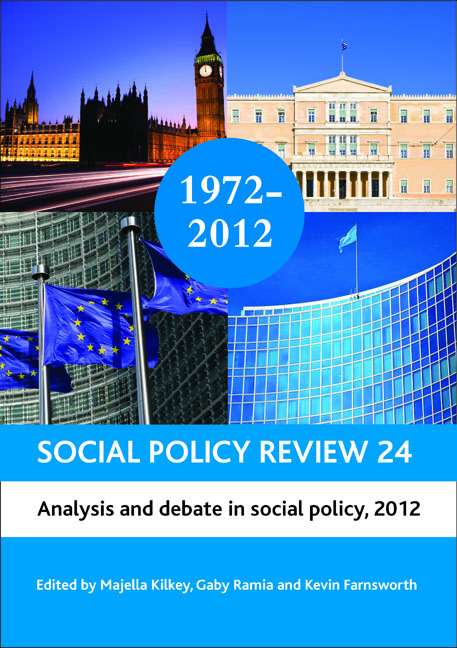twelve - From financial crisis to welfare retrenchment: assessing the challenges to the Irish welfare state
Published online by Cambridge University Press: 07 September 2022
Summary
Introduction
In 2008, the prolonged economic boom in Ireland came to an end. The global financial crisis collided with a precarious economic growth model and, since then, Ireland has been in almost constant crisis mode. A dramatic drop in economic growth and the insolvency of the banking system precipitated recession and a prolonged programme of austerity, which continues under the European Union (EU)/International Monetary Fund (IMF) loan agreement agreed in late 2010. Crisis has become the new normal, and because the strategy for recovery is seen to be so dependent on external forces and conditions, the situation remains uncertain. This chapter considers the impact of this crisis on the Irish welfare state. It begins by briefly sketching the background to the crisis, focusing in particular on the impact of the banking crisis for which the state has borne an enormous debt burden. The second part analyses the consequent impact on the welfare state and looks at how it has been challenged by the social costs of the recession while its capacity to cope has been weakened by retrenchment. The final part takes stock of the politics of retrenchment and what bearing this may have on the welfare state post-crisis. The assessment offered in this chapter can only be provisional as the Irish situation and the broader condition of the Eurozone has yet to reach a resolution and the contours of a post-crisis phase are still not clearly discernible.
Ireland's economic crisis and recession
Since the late 1950s, Ireland's economic strategy has concentrated on producing goods for export with a heavy emphasis on the participation of foreign industry by incentivising foreign direct investment. By the early 1990s, with the expansion of free trade across the EU through the creation of a single market, this strategy encountered hitherto unseen success as Ireland became an attractive location for new companies seeking a manufacturing base in Europe. Simultaneously, as financialised capitalism grew in significance, Ireland became ‘conspicuous in the new financial culture’ (Negra, 2010, p 840), gaining a substantial share of investment in financial services when its reputation for light regulation grew to match its established reputation as a low-cost competitive manufacturing centre.
- Type
- Chapter
- Information
- Social Policy Review 24Analysis and Debate in Social Policy, 2012, pp. 257 - 276Publisher: Bristol University PressPrint publication year: 2012



